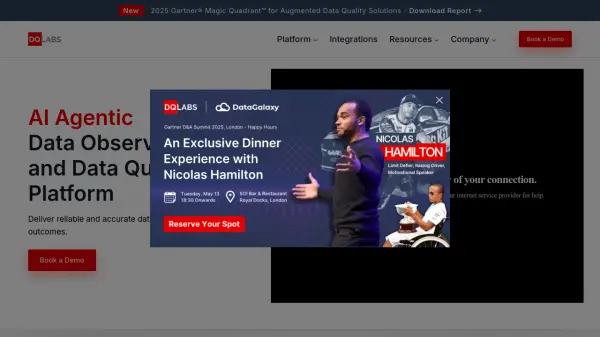What is DQOps?
DQOps is a comprehensive data quality operations center that empowers organizations to maintain, automate, and monitor the quality of their data using AI-driven technologies. Designed for a variety of data stakeholders—from data scientists to DevOps and business intelligence teams—DQOps integrates seamlessly into data pipelines, automating data profiling, anomaly detection, and the creation of customized quality checks with machine learning. The platform provides advanced rule mining and statistical analysis, offering over 150 built-in checks and customizable validation through YAML, Jinja2, and Python interfaces.
With features such as anomaly detection that accounts for seasonality, incident management workflows, and real-time KPI dashboards, DQOps ensures teams can systematically manage and prove the quality of their data. Organizations benefit from automated incident notifications, granular partition-level monitoring, and robust governance capabilities, making it easy to track, manage, and improve data quality at scale across various sources, data lakes, and warehouses.
Features
- AI-Powered Rule Automation: Uses machine learning to automatically generate and propose data quality checks.
- Anomaly Detection: Employs advanced AI algorithms to detect anomalies and schema drifts considering seasonality.
- Data Quality KPI Measurement: Calculates and displays numerical KPIs to prove and improve data quality.
- Custom Data Quality Dashboards: Enables creation of personalized dashboards for in-depth quality monitoring.
- Incident Management Workflows: Automatically groups and manages detected issues for streamlined response.
- Integration with Data Pipelines: Seamlessly runs data quality checks within live data workflows.
- Advanced Statistical Analysis: Provides instant insights with built-in statistical profiling of new data sources.
- Custom Rule Creation: Supports writing of tailored data quality checks using YAML, Jinja2, and Python.
- Partitioned Data Monitoring: Monitors large data tables effectively at the partition level.
- Automated Notifications: Customizable alerting for detected data quality incidents.
Use Cases
- Continuous monitoring of data quality in enterprise data warehouses.
- Automating validation checks during data pipeline development and operation.
- Detecting and managing anomalies in business intelligence dashboards.
- Implementing data governance with unified metrics and KPIs across the organization.
- Profiling and analyzing new data sources for machine learning projects.
- Ensuring compliance and data integrity during data sharing and migration.
- Creating custom dashboards to visualize and report on data quality performance.
- Incident notification and remediation workflow integration for data operations teams.
FAQs
-
What is the minimum subscription price for DQOps?
The minimum subscription price for DQOps is $600 per month, billed annually for the Personal edition. -
How does DQOps automate data quality checks?
DQOps uses AI-powered rule mining to automatically configure and propose data quality checks based on the characteristics of your data. -
Can DQOps integrate into existing data pipelines?
Yes, DQOps allows integration of data quality checks directly into data pipelines and workflows, enabling automated validation during data ingestion and transformation. -
What types of data sources can DQOps monitor?
DQOps can monitor various data sources, including data warehousing, data lakes, business intelligence platforms, and more with configurable SQL query templates. -
Does DQOps provide incident management?
Yes, DQOps features incident management workflows that group, track, and notify users about data quality incidents, enabling effective resolution.
Related Queries
Helpful for people in the following professions
DQOps Uptime Monitor
Average Uptime
99.14%
Average Response Time
123.87 ms
Featured Tools
Join Our Newsletter
Stay updated with the latest AI tools, news, and offers by subscribing to our weekly newsletter.












